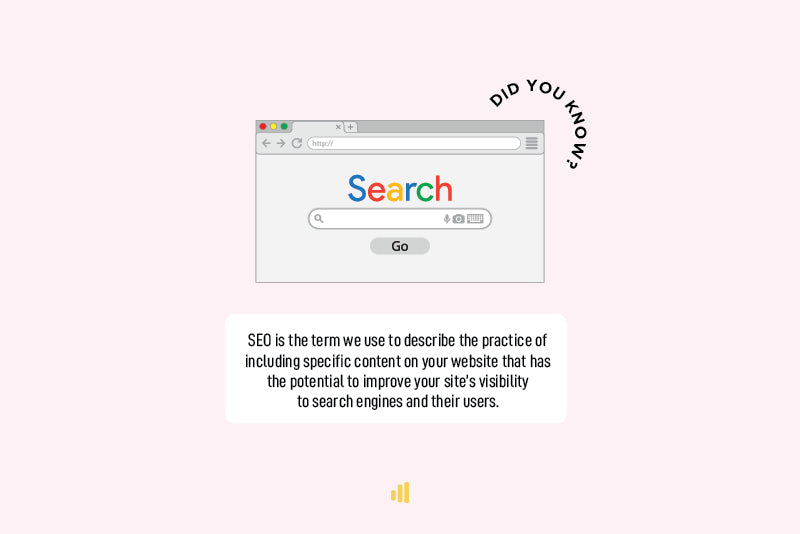While common types of search intent include informational, commercial, navigational and transactional – what does it all actually mean, and why does it matter?
Firstly, you’ll need to understand keywords and the fundamentals of SEO, or Search Engine Optimisation. SEO is the term we use to describe the practice of including specific content on your website that has the potential to improve your site’s visibility to search engines and their users. Put simply, it helps your site show up more often in relevant searches, and is crucial if you want to reach the lofty heights of Google rankings.

In comparison, keywords are how brands and businesses can attempt to rank for the right search terms – or get seen by the right people online. When linking search intent with keywords, it’s not about understanding the “what” behind consumer queries, but rather the “why”.
Breaking Down What Search Intent Is All About
Search intent (or user intent, audience intent) is the term used to describe the purpose of an online search. It’s the reason why someone conducts a specific search, and what they hope to achieve out of said search. According to the big wigs at Google and most digital marketing professionals, there are four distinct search intent categories that almost every search term falls under.
Informational – The internet is the world’s greatest hub for general information, and many queries simply boil down to a user just wanting generalised information about a topic or subject. Users often type in a long tail keyword, which usually presents as a question, or a query that requires an in depth or straightforward response (sometimes both).
Commercial – This form of search intent is usually derived from a user that is in the market for a specific product or service, but has yet to make a final decision on which solution is right for them. The query can involve asking for locations, reviews or comparisons to other competitors.
Navigational – Relatively straightforward, the user usually knows exactly what they’re on the hunt for, but find it easier to type the search term into Google as opposed to remembering the URL or domain (such as accessing Facebook). Your user already knows where they want to go.
Transactional – Your user is on the hunt to make a purchase and are in buying mode, but this may be their first point of research surrounding the product or service. They may know what they want to buy, but not quite where they plan on buying it from.

How To Write For Search Intent
Like everything else Google related, how it ranks and delivers results based around search intent is constantly changing. However, if you’re already optimising the content that you produce, then you already have a head start as opposed to doing nothing.
If you’re not doing so already, start by getting your hands dirty with keyword research. There are quite literally thousands of platforms and programs available for marketers, brands and businesses to use in the hopes of finding the keywords to use that best fit their product or service. While many offer a paid subscription model, one of the best options available is the free module that Google itself provides, known as the Google Keyword Planner.
When sourcing keywords that are appropriate for your product, service, sector or industry, there are a few things to consider in order to see some tangible results. These include:
Search Volume – How many people are on the hunt for the specific keyword?
Search Intent – What are users hoping to achieve through search results?
Value – How much will you pay to use this keyword via paid cost per click advertising?
Difficulty – How many other competitors are trying to target the same keyword?
If you haven’t done so already, start checking out the competition. See what your industry peers are writing about, as this is usually a good indication that they’re also paying attention to search intent and the best keywords to deploy if you sell similar products or services.
When it comes to the content itself, start diversifying the type of articles or blogs that you’re producing. If you’re starting to consciously write for search intent purposes, start out with “how to” guides, step by step tutorials, list style posts, opinion pieces, reviews and comparisons. Using your back end analytics, you’ll soon see what is resonating with audiences and getting those elusive clicks.
When it comes to writing with search intent in mind, combining the information provided via the above four factors will help you to determine whether a specific keyword is worth pursuing or not. After all, producing content takes time, so it’s only natural that you want your efforts to be rewarded with results.
Where To Source Help With Search Intent Based Content
Producing quality, consistent and on brand content takes time, effort, experience and resources – and you’re not alone if you can’t quite commit to that. Avoiding the use of keywords and content marketing all together may actually be doing your brand a disservice, but thankfully, investing in a solid content marketing strategy has never been easier.
Here at Content Hive, producing top quality video and digital content is exactly what we do best. We have itemised a list of digital content services, and allocated credits next to each of these. This means that each month, you can use your credits with us to produce digital content such as social media posts, blog articles, videos and even animated Instagram stories.
We believe that this model means we can produce high quality content in faster than normal delivery times. It also means that because you have a monthly credit, you are going to want to make sure you use these up – and so do we – meaning that your digital content is always consistent.
If you aren’t quite sure where to start on your digital marketing journey and would like to speak to a professional, why not book in a free discovery call with us at Content Hive today to discuss how we can get your brand buzzing online.


